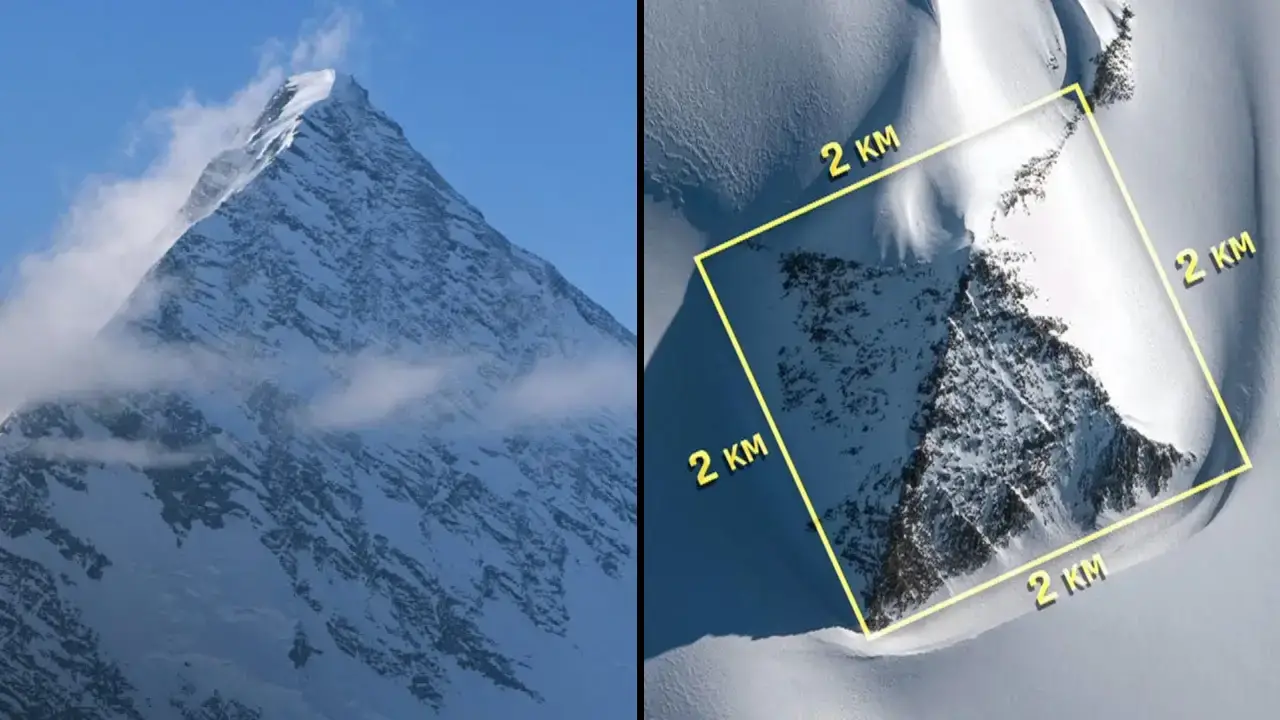
Credit: History via YouTube
‘Pyramid-Like’ Mountain Discovered Sitting Beneath Ice In Antarctica
The internet has been buzzing with rumours about an extraordinary ‘pyramid-like’ discovery in Antarctica.
Yes, you heard that right.
Antarctica, the icy continent that’s better known for penguins than architectural wonders, seems to have a surprise in store for us.
Satellite images captured over the southern part of Antarctica’s Ellsworth Mountain range have revealed some peculiar peaks, with one standing out like a sore thumb.
This particular peak has a base measuring a whopping two kilometres square in each direction, bearing an uncanny resemblance to the legendary Great Pyramid of Giza in Egypt.
Related Article: Reason Why Everest Makes Seriously Disturbing Sounds At Night Time
Related Article: People Are Just Discovering ‘Third Man Syndrome’ And It’s Freaking Them Out
Cue the conspiracy theories and wild speculations.
As the news spreads like wildfire across Twitter, theories about the mysterious structure’s origin are surfacing.
A few people point to evidence of past plant life in Antarctica, suggesting that the continent was once a warm, lush rainforest with a temperature of around 55°F (12°C).
One person tweets: “This structure belongs to the civilisation which existed before the flood. Around 10,000 years ago Antarctica was warm.”
However, it’s believed Antarctica actually reached those temperatures around 83 million years ago, rather than 10,000.
Another, of course, comments: “Illuminati confirmed.”
While these theories sound like a stretch, they would undoubtedly make the icy landscape more habitable for ambitious pyramid builders.
But before we dive headfirst into a world of pyramid-building snowmen or secretive organisations, let’s consider the more rational explanation provided by geology expert Eric Rignot.

Professor Rignot, a geology guru from the University of California, has put our minds at ease by clarifying that the apparent pyramid is nothing more than a mountain with a pyramidal peaked shape.
He tells Live Science: “This is just a mountain that looks like a pyramid.”
These formations, known as ‘pyramidal peaked mountains’, are a result of the convergence of glaciers on the sides of existing landmasses.
So, in essence, we’re dealing with a mountain masquerading as a pyramid.
Although this particular discovery might not lead to hidden chambers or ancient civilisations, it does highlight the wonders of nature’s diverse creations.
Other pyramid-shaped mountains, such as Mount Búlandstindur in Iceland and Bordoyarnes Mountain on the Faroe Islands, exist to back up this geological explanation.
Related Article: People Are Convinced There’s A ‘Glitch In The Matrix’ After Plane Spotted Not Moving In Sky
Related Article: Expert Solves Mystery Of Why We Never Seem To See Baby Pigeons
So, there you have it – while the idea of a pyramid in Antarctica may have sparked our imagination, it’s merely nature playing tricks on us.
No penguins, no aliens, just a quirky mountain formation in a land of ice and snow.
Nevertheless, the excitement around this discovery reminds us that there are still many mysteries waiting to be unravelled, whether buried deep within the Earth or floating among the stars.
Until the next mind-boggling news hits the internet, let’s revel in the marvels of our world, even if they aren’t ancient pyramids.
Watch our Video of the Day below…